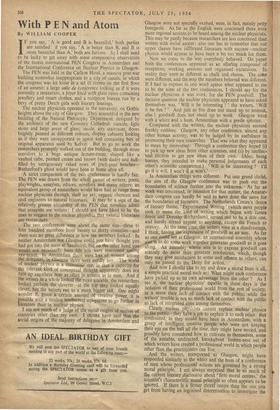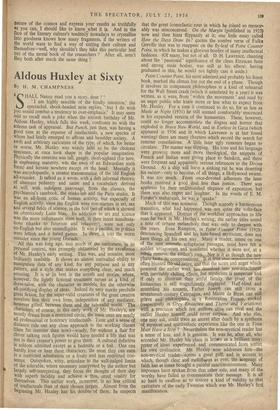With P E N and Atom
By WILLIAM COOPER IF you say, 'A is good and B is beautiful,' both parties are satisfied: if you say, 'A is better than B. and B is more beautiful than A,' both are furious. Sy I shall need to be lucky to get away with some comparative observation of the recent international PEN Congress in Amsterdam and the International Conference on Nuclear Physics in Glasgow. The PEN was held in the Carlton Hotel, a massive post-war building somewhat inappropriate to a city of canals, in which of the recent international PEN Congress in Amsterdam and the International Conference on Nuclear Physics in Glasgow. The PEN was held in the Carlton Hotel, a massive post-war building somewhat inappropriate to a city of canals, in which the congress was let loose in a set of rooms on the first floor of an annexe; a large salle de conference looking as if it were normally a restaurant, a foyer lincd with glass cases containing jewellery and Smart clothes, and a reception bureau run by a bevy of pretty Dutch girls with literary leanings. The nuclear physicists operated in the university, on Gothic heights above the city of Glasgow. They assemb,lcd in the new building of the Natural Philosophy Department, designed by the architect of the new Coventry Cathedral; outside, light stone and large areas of glass: inside, airy staircases, doors brightly painted in different colours, display cabinets looking as if they were unsupported in space and containing bits of original apparatus used by Kelvin. But to go to work the researchers promptly walked out of the building, through stone corridors to a huge antique lecture-room, shaped like a vaulted cube, painted cream and brown (with dado) and half- filled by vertiginously raked rows of pitch-pine benches- Rutherford's ghost would have been at home after all. A strict comparison of the two conferences is hardly fair. The PEN was drawn from the whole gamut of writers; poets, playwrights, essayists, editors, novelists and many others; an equivalent group of researchers would have had to range from nuclear physicists through, shall we say, organic chemists and civil engineers to natural historians. It may be a sign of the relatively greater amiability of the PEN that novelists admit that essayists are writers: I should not have liked to be the man to suggest to the nuclear physicists that natural historians are researchers.
The two conferences were about the same size—three to four hundred members from twenty to thirty countries—and there was no great difference in how the members looked. In neither Amsterdam nor Glasgow could you have thought you had got into the mess at Sandhurst, but on the other hand you would not necessarily have felt you were marooned among erg-headg. In Amsterdam there were lots of women among the delegates. in C.aftssow there were hardly any. The world of nuclear physics is a masculine one, in that a capacity. for the relevant kind of conceptual thought apparently does not turn up anywhere near as often in women as in men. And if the writers as a whole looked the more amiable, the researchers looked perhaps the cleverer—at the top they looked equally clever, but the writers ran to a much bigger tail. One might wonder if, given a certain amount of creative power, it is possible with a modest intellectual equipment to go further in literature than in nuclear physics. I am not much of a judge of the social origins of natives of countries other than my own. I should have said that the social origins of the majority of delegates in Amsterdam and Glasgow were not specially exalted, were, in fact, mainly petty bourgeois. As far as the English were concerned there were more regional accents to be heard among the nuclear physicists. This may be partly because researchers are less concerned than writers with social ascent : also one has to remember that our upper classes have infiltrated literature with success—nuclear physics would appear to have been a bit too much for them.
Now we come to the way everybody behaved. On paper both the conferences appeared as an alluting compound of receptions, working sessions and organised excursions. In reality they were as different as chalk and cheese. The ails were different, and the way the members behaved was different. ^ If I had to express in one word apiece what appeared to me to be the aims of the two conferences. I should say for the nuclear physicists it was work, for the PEN goodwill. The decisive question the nuclear physicists appeared to have asked themselves was, Will it be interesting ? ' the writers, 'Will it be fun ? ' And just as fun does not stand up to interest, alas ! goodwill does not stand up to work. Glasgow went with a whizz and a hum, Amsterdam with a gentle splutter.
Compared with the writers, the nuclear physicists seemed frankly ruthless. Glasgow, any other conference, almost any . other human activity, was to be judged by its usefulness in promoting their own researches. That was what they appeared to mean by interesting. Through a conference they hoped (i) to pick up new ideas from other scientists, and (ii) by intellec- tual friction to get new ideas of their own. (Also, being human, they intended to make personal judgements of each other's scientific competence.) 'Will it be interesting ? go if it will, I won't if it won't.'
In Amsterdam things were different. Put into grand clich6„ the aim of the Glasgow conference was to push out the boundaries of science further into the unknown. As far as work was concerned, or intention for that matter, the Amster- dam congress can hardly be said to have done the same for the boundaries of literature. The Netherlands Centre's '.hoice of literary theme, 'Experimental Writing' (which most people took to mean the kind of writing which began with James Joyce and Dorothy Richardson), turned out to be a dim one, and hardly stirred anyone to anything, except the French to oratory. At the same time, the writers were at a disadvantage, I think, having_the expression of goodwill as an aim. As far as one tdalee at Glasgow, an international assembly whose to do some work together generates goodwill as it goes along. An assembly whose aim is to express goodwill can scarcely do more than generate resolutions, which, though they may give satisfaction to some and offence to others, can only be passed to the Deity for action. • And now I shodId like to try and draw a moral from it all, a simple practical moral such as: What might each conference have picked up to its own advantage from the other ? As I see it, the nuclear physicists' tremble in these days is the isolation of their professional world from the rest of society, in a sense their lack of contact with the public; while the writers' trouble is not so much lack of contact with the public as lack of integrated aims among themselves.
Clearly nuclear physicists cannot explain nuclear physics to the public—they halm a job to explain it to each other. But confronted, as they would have been in Amsterdam, with a group of intelligent creative people who were not keeping their eye on the ball all the tinze, they might have envied, and possibly have considered how to cultivate in themselves, some of the amiable, undirected, knockabout human-ness out of which writers have created a professional world in which people other than the practitioners can live.
And the writers, transported to Glasgow, might have responded similarly to the whizz and the hum of a conference of men whose professional actions are governed by a strong moral principle. I am always surprised that in so much of the current literary discussion about 'firm moral centres,' the scientist's characteristic moral principle so often appears to be ignored. If there is a firmer Moral centre than the one you get from having an ingrained determination to investigate the nature of the cosmos and express your results as truthfully ft; you can, I should like to know what it is. And in the !ace of the literary culture's tendency nowadays to crystallise Into goodness knows how many fragments, if the writers of the world want to find a way of uniting their culture and themselves—well, why shouldn't they take this particular leaf Out of the moral book of the researchers ? After all, aren't they both after much the same thing ?



































 Previous page
Previous page